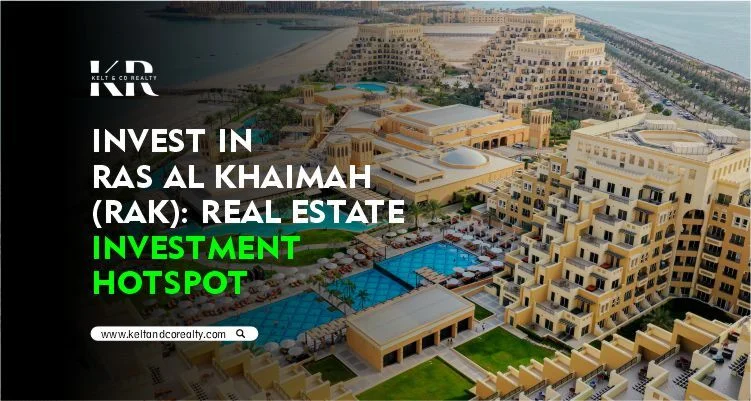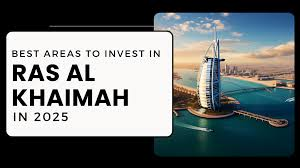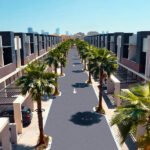Now Reading: VAT and Property Taxes in Ras Al Khaimah: What Expats Should Know in 2025
-
01
VAT and Property Taxes in Ras Al Khaimah: What Expats Should Know in 2025
VAT and Property Taxes in Ras Al Khaimah: What Expats Should Know in 2025
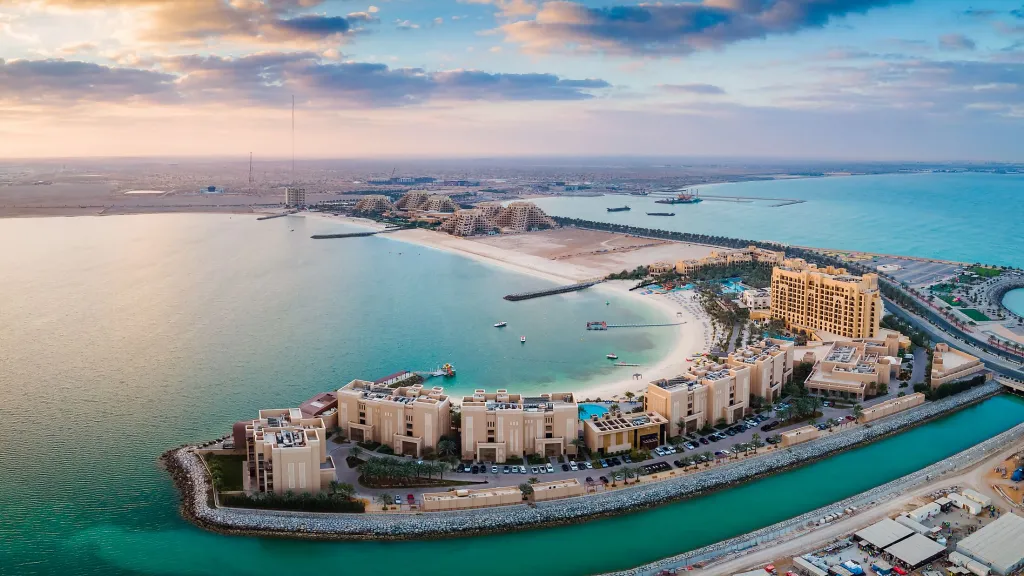
Table of Contents
Ras Al Khaimah (RAK), with its AED 20 billion real estate market, Property and 5,200 Q1 2025 transactions (RAK Department of Economic Development), is a magnet for expat investors due to its tax-friendly environment and high yields (5–8%). Introduced in 2018, the UAE’s 5% Value Added Tax (VAT) impacts certain real estate transactions, while RAK’s absence of property taxes enhances its appeal.
This guide details VAT and property tax rules for expats in RAK, tailored to your interest in UAE property trends, blockchain, smart homes, off-plan investments, and prior queries on taxes, depreciation, residency, and capital gains tax (CGT). Insights are drawn from the Federal Tax Authority (FTA), RAK Department of Economic Development (DED), Property Finder, gulfnews.com, and X sentiment.
- Market Context: RAK’s AED 20B real estate market in 2024, 5,200 Q1 2025 transactions, per RAK DED. Known for tax-free yields (5–8%) and free zones like RAKEZ and RAK ICC.
- Focus: Explains VAT (5%) and property tax rules for expats investing in RAK real estate, covering residential, commercial, and free zone properties, with compliance and home country tax considerations.
- Relevance: Aligns with your interest in UAE property trends, blockchain, smart homes, off-plan investments, and queries on taxes, depreciation, residency visas, and CGT minimization.
- Sources: FTA, RAK DED, Property Finder, gulfnews.com, hlbhamt.com, blackswanbss.com, pantheondevelopment.ae, PwC, OECD, and X sentiment.
VAT Rules for Real Estate in Ras Al Khaimah
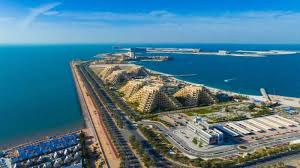
Introduced on January 1, 2018, at 5%, VAT is a consumption tax levied on taxable supplies, collected by businesses and remitted to the FTA. RAK’s real estate transactions face varied VAT treatments based on property type, transaction nature, and location (mainland or free zones). Below are key VAT rules for expats:
1. Residential Properties
- First Supply (Within 3 Years):
- Rule: Sales or leases of new residential properties (e.g., villas, apartments in Al Hamra Village) within three years of completion are zero-rated (0% VAT), allowing developers to recover input VAT, per FTA.
- Impact: Reduces purchase costs for expats buying off-plan or new properties (e.g., AED 1.5M RAK Central villa, no VAT), per pantheondevelopment.ae.
- Example: Buying a AED 2M Al Hamra villa from a developer incurs no VAT, saving AED 100K vs. a commercial property.
- Subsequent Supplies:
- Rule: Sales or leases after the first supply are VAT-exempt, meaning no VAT is charged, and input VAT cannot be recovered, per hlbhamt.com.
- Impact: Simplifies costs for expats reselling or renting, supporting 5–7% yields (AED 100K–350K/year on AED 2M–5M properties), per Property Finder.
- Example: Reselling a AED 2M villa or renting it for AED 120K/year incurs no VAT.
- Long-Term Leases (>6 Months):
- Rule: Residential leases exceeding six months are VAT-exempt, per FTA.
- Impact: Enhances rental demand in areas like Al Marjan Island (AED 80K–150K/year), per gulfnews.com.
- Example: A AED 1.8M RAK Central apartment leased for AED 100K/year is VAT-exempt.
- Short-Term Leases (≤6 Months):
- Rule: Subject to 5% VAT, per FTA.
- Impact: Adds AED 4K–12K/year to holiday home rentals (AED 80K–240K/year), per Property Finder.
- Mitigation: Structure leases >6 months or absorb VAT to compete.
2. Commercial Properties
- Sales and Leases:
- Rule: Sales and leases of commercial properties (e.g., offices, warehouses in RAKEZ) are taxed at 5% VAT, per hlbhamt.com.
- Impact: Adds 5% to costs (e.g., AED 50K VAT on AED 1M office sale), but VAT-registered expats can recover input VAT, per FTA.
- Example: Leasing a AED 500K/year RAKEZ warehouse incurs AED 25K VAT, recoverable if registered.
- Free Zone Exceptions:
- Rule: Commercial transactions between free zone entities in Designated Zones (e.g., RAKEZ’s Al Ghail Industrial Zone) may be zero-rated or exempt, per PwC.
- Impact: Saves 5% on intra-free zone deals (e.g., AED 25K on AED 500K lease).
- Example: A RAKEZ office leased to another free zone company for AED 200K/year incurs no VAT.
- Property Management Services:
- Rule: Services like maintenance or lease management for commercial properties incur 5% VAT, per blackswanbss.com.
- Impact: Adds AED 1K–10K/year, recoverable for VAT-registered businesses.
- Example: AED 50K/year RAKEZ office maintenance incurs AED 2.5K VAT.
3. Bare Land
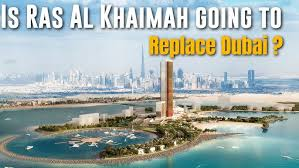
- Rule: Sales of undeveloped land are VAT-exempt, per FTA.
- Impact: Saves 5% on land costs (e.g., AED 50K on AED 1M Al Hamra plot), attracting developers, per Property Finder.
- Example: Buying a AED 2M RAKEZ industrial plot incurs no VAT, reducing upfront costs.
4. Property Management and Related Services
- Rule: Services for residential properties (e.g., maintenance, agency fees) incur 5% VAT, even if the property is exempt, per hlbhamt.com.
- Impact: Adds AED 1K–10K/year (e.g., AED 2K VAT on AED 40K agency fee for AED 2M villa sale), per gulfnews.com.
- Example: AED 30K/year maintenance for an Al Marjan Island villa incurs AED 1.5K VAT.
- Mitigation: Negotiate inclusive contracts or recover VAT if registered.
5. VAT in Free Zones (RAKEZ)
- Rule: RAKEZ, a Designated Zone, allows zero-rated VAT for transactions between free zone entities, but mainland sales/leases incur 5% VAT, per PwC.
- Impact: Saves 5% on free zone deals (e.g., AED 100K on AED 2M warehouse sale).
- Example: A RAKEZ company sells a AED 3M office to another free zone entity, zero-rated, saving AED 150K VAT.
- Limitation: Input VAT on non-qualifying activities (e.g., residential rentals to individuals) is non-recoverable.
6. VAT Registration and Compliance
- Mandatory Registration:
- Rule: Businesses with taxable supplies >AED 375,000/year must register for VAT, per FTA.
- Impact: Applies to expats with commercial properties or high service fees, requiring VAT collection and quarterly filings.
- Example: Leasing AED 500K/year RAKEZ offices triggers registration.
- Voluntary Registration:
- Rule: Supplies >AED 187,500/year allow voluntary registration to recover input VAT, per hlbhamt.com.
- Impact: Benefits expats with high maintenance/agency costs (AED 10K–50K/year).
- Penalties:
- Rule: Non-compliance (e.g., late filing, incorrect invoices) incurs fines of AED 1,000–50,000, per blackswanbss.com.
- Impact: Risks delays or costs for unregistered expats, per X sentiment.
- Mitigation: Use services like HLB HAMT (AED 500–5,000/year) for compliance.
- Record-Keeping:
- Rule: Retain records for 5 years (15 years for real estate), per FTA.
- Impact: Ensures audit compliance, avoiding penalties.
7. Input VAT Recovery
- Rule: VAT-registered expats can recover input VAT on expenses for taxable or zero-rated supplies (e.g., commercial leases, construction), per FTA.
- Impact: Offsets costs (e.g., AED 25K recovery on AED 500K warehouse fit-out), per hlbhamt.com.
- Example: AED 50K VAT on RAKEZ office maintenance is recoverable.
- Limitation: Input VAT on exempt supplies (e.g., residential rentals) cannot be recovered.
Property Taxes in Ras Al Khaimah
- No Annual Property Tax:
- Rule: RAK imposes no annual property tax on residential or commercial properties, per RAK DED and gulfnews.com.
- Impact: Saves AED 10K–100K/year vs. 0.5–2% taxes in US/UK (e.g., AED 50K/year on AED 5M villa), boosting net yields (5–8%).
- Example: A AED 3M Al Hamra villa incurs no property tax, unlike AED 60K/year at 2% in California.
- No Inheritance Tax:
- Rule: No tax on property transfers to heirs, per blackswanbss.com.
- Impact: Saves 20–40% vs. UK/US (e.g., AED 600K–1.2M on AED 3M villa).
- Example: A AED 5M RAK Central villa passed to heirs incurs no tax.
- Transfer Fees:
- Rule: 2% property transfer fee, split between buyer and seller, per RAK DED.
- Impact: Lower than Dubai’s 4%, costing AED 20K–100K on AED 2M–5M properties.
- Example: Buying a AED 3M Al Marjan Island villa incurs AED 30K fee (1% each party).
Financial Snapshot
- Property Prices:
- Residential: AED 1M–5M (Al Hamra, RAK Central).
- Commercial: AED 1M–10M (RAKEZ offices, warehouses).
- Initial Costs:
- Transfer Fee: 2% (AED 20K–200K, split).
- Agent Fee: 2% + 5% VAT (AED 21K–105K).
- AML/KYC: AED 5K–20K.
- Ongoing Costs:
- Service Fees: AED 10K–50K/year.
- Utilities: AED 20K–100K/year.
- VAT on Services: AED 1K–5K/year.
- VAT Savings:
- Residential: 0% on first supply/subsequent (AED 100K–250K on AED 2M–5M).
- Commercial (Free Zone): 0% on qualifying deals (AED 50K–150K).
- Property Tax Savings:
- No Annual Tax: AED 10K–100K/year.
- No Inheritance Tax: AED 200K–2M on AED 1M–5M.
- Returns (Tax-Free in UAE):
- Yields: 5–7% residential, 6–8% commercial (AED 50K–800K/year).
- Appreciation: 3–6% (AED 30K–600K/year).
- Home Country Taxes: 15–30% (AED 15K–240K on AED 100K–800K), mitigable via DTAs.
Strategic Considerations for Expats
- Residential Investments:
- Why: Zero-rated first supply, VAT-exempt rentals, no property tax, 5–7% yields.
- Example: AED 2M Al Hamra villa saves AED 100K VAT, yields AED 100K–140K/year.
- Action: Buy off-plan (e.g., One RAK Central, AED 1.5M–3M) for VAT savings.
- Commercial Investments:
- Why: Zero-rated in RAKEZ, recoverable VAT, 6–8% yields.
- Example: AED 5M RAKEZ warehouse saves AED 250K VAT, yields AED 300K–400K/year.
- Action: Register as QFZP in RAKEZ, lease to free zone entities.
- Visa Eligibility:
- Why: AED 1M+ property grants 12-year RAKEZ visa, enhancing tax residency to mitigate home country taxes, per RAKEZ.
- Example: AED 2M RAK Central villa secures visa, saves AED 180K on AED 600K gain via UK DTA.
- Action: Invest via RAK DED, obtain UAE tax residency certificate (AED 2,000–5,000).
- Compliance:
- Why: Avoids AED 1,000–50,000 fines, ensures AML adherence (fines up to AED 5M), per blackswanbss.com.
- Action: Use HLB HAMT for VAT filing, retain records 15 years.
- Smart Homes:
- Why: Saves 10–15% utilities (AED 5K–15K/year), aligns with your interest.
- Example: AED 2.5M RAK Central smart villa saves AED 10K/year.
- Action: Buy IoT-enabled properties or retrofit (AED 50K–200K).
Challenges and Mitigations
- VAT on Services:
- Challenge: 5% VAT on maintenance/agency fees (AED 1K–10K/year), non-recoverable for non-registered expats, per hlbhamt.com.
- Mitigation: Register for VAT if eligible, negotiate inclusive fees.
- Home Country Taxes:
- Challenge: 15–30% taxes on rents/gains (AED 15K–240K), per OECD.
- Mitigation: Use 140+ DTAs, establish UAE residency via 12-year visa.
- Compliance Costs:
- Challenge: AED 500–5,000/year for VAT filing, fines up to AED 50,000, per blackswanbss.com.
- Mitigation: Use automated platforms (e.g., HLB HAMT), budget for AML/KYC (AED 5K–20K).
- Oversupply Risk:
- Challenge: 5,200 new units in 2025 may dip yields by 1–2%, per RAK DED.
- Mitigation: Target Al Hamra, RAK Central for high demand.
Recommendations for Expats in 2025
- Budget Investors (AED 1M–2M):
- Action: Buy off-plan Al Hamra apartments (AED 1M–1.5M, 5–7% yields), secure 12-year visa.
- Example: AED 1.5M apartment saves AED 75K VAT, yields AED 75K–105K/year.
- Mid-Tier Investors (AED 2M–5M):
- Action: Invest in Al Marjan Island villas (AED 2M–5M, 5–7% yields) or RAKEZ offices (AED 3M, 6–8% yields).
- Example: AED 3M villa yields AED 150K–210K/year, VAT-exempt.
- Commercial Investors:
- Action: Lease RAKEZ warehouses (AED 5M–10M) to free zone entities, register for VAT.
- Example: AED 5M warehouse saves AED 250K VAT, yields AED 300K–400K/year.
- Tax Optimization:
- Action: Hold properties personally, use DTAs, apply for UAE residency.
- Example: US expat avoids 15% CGT on AED 600K gain via DTA.
- Due Diligence:
- Action: Verify escrow via RAK DED, ensure AML compliance, use RERA brokers.
- Example: AED 2M Al Hamra purchase confirmed, no delays.
X Sentiment
- X posts celebrate RAK’s “no property tax” and “low VAT” appeal, with @InvestRAK noting Al Hamra’s tax-free yields as a “top expat pick.”
- Some expats flag service VAT costs (AED 1K–10K/year) and AML scrutiny, but optimism persists for 5–8% yields and 12-year visas, per X discussions.
Conclusion
In 2025, RAK’s real estate market offers expats a tax-friendly haven, with no annual property tax or inheritance tax (saving AED 10K–2M/year on AED 1M–5M properties) and strategic VAT benefits. Residential properties are zero-rated (0% VAT) for first supply (saving AED 100K–250K) and VAT-exempt thereafter, while commercial properties in RAKEZ free zones may be zero-rated, saving 5% (AED 50K–150K). Services incur 5% VAT (AED 1K–10K/year), recoverable for VAT-registered expats.
Compliance is critical, with fines up to AED 50,000 and AML penalties up to AED 5M. Mitigating home country taxes (15–30%) via 140+ DTAs and securing 12-year visas (AED 1M+ investment) enhances returns. By targeting off-plan Al Hamra villas, RAK Central apartments, or RAKEZ commercial properties, expats can achieve 5–8% tax-free yields in the AED 20B market, aligning with your investment goals in RAK’s dynamic landscape. watch more like this
read more here: How to Qualify for Real Estate Tax Breaks in Ras Al Khaimah (RAK) in 2025



